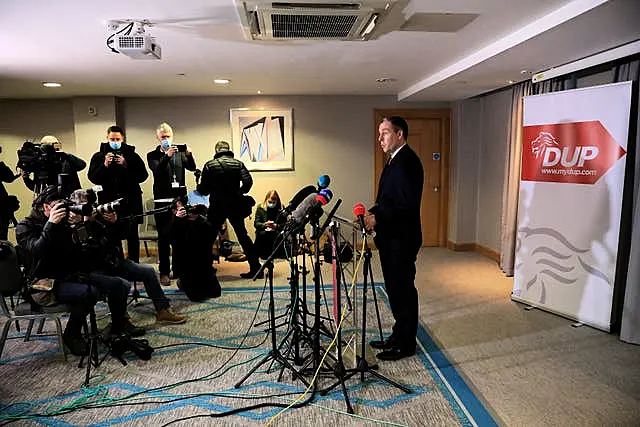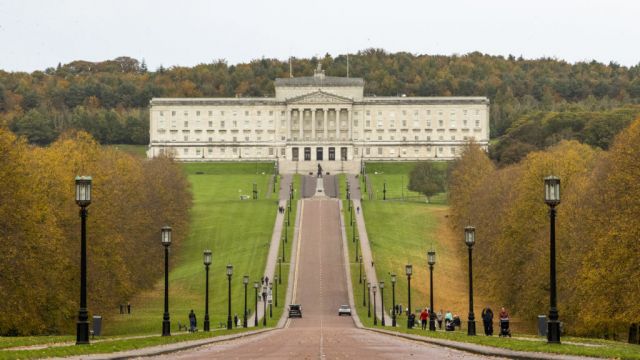Voters in Northern Ireland face the prospect of returning to the polls in December, a little over seven months after the last Assembly election.
Here are answers to some of the key questions about the political turmoil at Stormont.
What caused the latest powersharing impasse?
Powersharing has been in flux since February when the DUP withdrew its first minister Paul Givan in an escalation of its campaign against the Northern Ireland Protocol, a part of the UK's Brexit deal with the European Union that governs trade in the region.
The North’s largest unionist party vowed to disengage with the devolved institutions in Belfast until decisive action was taken to remove the new rules on trade with Britain.

Mr Givan’s resignation automatically ousted Sinn Féin’s deputy first minister Michelle O’Neill, as powersharing rules mean one cannot hold office without the other being in post.
Other departmental ministers remained in position, but the wider executive was unable to meet and major policy decisions could not be taken.
How did the picture change in May’s Assembly election?
The scheduled Assembly election on May 5th saw Sinn Féin displace the DUP as the largest party in Northern Ireland – the first time a nationalist party had come out on top.
The result meant Sinn Féin was entitled to the first minister’s post, with the DUP in line for the deputy first minister’s role.
However, the DUP maintained its block on the operation of a fully functioning executive and refused to nominate a deputy first minister.
That made the formation of a new ministerial executive impossible.
The DUP also blocked the election of a new Assembly speaker – a move that prevented the legislature at Parliament Buildings sitting.

What has happened since May?
The DUP has maintained its stance – meaning an executive has not been formed and the Assembly and its associated scrutiny committees have been unable to meet to undertake normal business.
Prior to a recent law change, the failure to nominate first and deputy first ministers following an election would have left Northern Ireland without any ministers in post.
However, rule changes delivered by the 2020 New Decade, New Approach agreement enabled departmental ministers from the previous mandate to remain in post (as long as they were re-elected as MLAs).
That has essentially led to a continuation of the post-February status quo – with all ministers, apart from the first and deputy first ministers, continuing in their jobs.
Those ministers have been severely hamstrung in the decisions they can take, and any significant executive-wide policy moves, such as passing a budget, have not been possible.
Why is there a deadline on Friday?
Prior to New Decade, New Approach, a failure to fill the roles of first and deputy first minister within seven days of the first post-election sitting of a new assembly saw the British government assume a legal duty to call another election within a reasonable timeframe.
While this was the legal position following the March 2017 snap election (triggered by the resignation of the late Sinn Féin deputy first minister Martin McGuinness), the British government never actually called another election – instead opting to bring forward legislation that pushed back the requirement to call a poll during what became a three-year powersharing vacuum.

New Decade, New Approach was the deal that restored powersharing in January 2020. It included provisions aimed at creating a greater degree of stability at Stormont in the event of another executive implosion.
It removed the seven-day “cliff edge” for forming a new administration and replaced it with a maximum timeframe of 24 weeks. The agreement also allowed departmental ministers to remain in post for those 24 weeks.
That deadline runs out on Friday. At that point the sitting ministers will be removed from office and the UK government will assume responsibility to call an election within 12 weeks.
The DUP has made clear it does not intend to drop its boycott prior to Friday, citing a lack of progress in UK/EU efforts to resolve issues with the protocol, so unless the party has a sudden change of heart, it will not be possible to form an executive before the deadline.

While the British government could do what it did between 2017-20, and amend the legislation to push back the election deadline, it has not shown any appetite to do so.
Northern Ireland Secretary Chris Heaton-Harris has made clear he will call an election if Friday’s deadline passes without an executive having been formed.
It is understood any poll would take place on December 15th.







